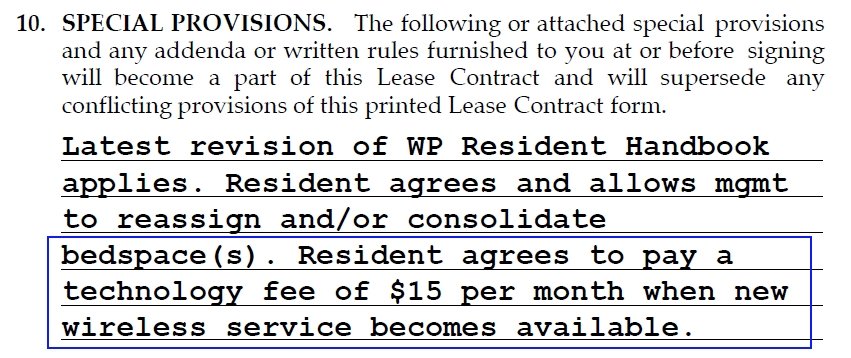 University of Texas students living in a Richardson on-campus apartment complex are stuck paying a mandatory $15 monthly “technology fee” for AT&T-provided Wi-Fi service that works so poorly, many residents are signing up with other providers and paying twice for Internet access.
University of Texas students living in a Richardson on-campus apartment complex are stuck paying a mandatory $15 monthly “technology fee” for AT&T-provided Wi-Fi service that works so poorly, many residents are signing up with other providers and paying twice for Internet access.
Residents of Waterview Park have complained about Wi-Fi access inside the complex for some time, but they were never forced to pay for it until May, when the complex’s governing board notified residents that the mandatory fee would be imposed once AT&T took over the service.
Although AT&T doesn’t bill for, or collect the fee, they do provide the service, and students have complained loudly about its weak signals and poor performance.
The Mercury, the university newspaper, ran a story this weak outlining the complaints:
Computer science junior Kenny Rodriguez said the problems stem from the use of hotspot Wi-Fi as residential internet for students. Hotspot Wi-Fi generally broadcasts an internet signal from a fixed location that becomes weaker the further you move away from it.
“When I was living in building 29, my roommates and I could only pick up a signal by standing in one corner of the living room,” junior Michael Stettler said.
Stettler and his roommates moved to building 31 and are now able to pick up a signal in two of their bedrooms, albeit a slow one.
Rodriguez, who lives in building 8, can only pick up a signal in his living room and sometimes can’t even log on to use it.
“Frequently, the access points are broadcasting but aren’t routing traffic anywhere,” Rodriguez said.
Once a student finds a place in his apartments where a signal can be received, the speed of the connection becomes a problem because the more students who share the available bandwidth the slower the speed becomes.
“It was decently fast at the beginning of this school year, then when everyone came back for fall it crawled to like a tenth or a fifth of a MB per second,” Stettler said.
 Waterview’s management has been forced to issue refunds of up to $30 to affected students for poor or non-existent service, but the complex won’t waive the ongoing monthly fee, despite the fact the service can’t deliver much more than 1Mbps on a good day.
Waterview’s management has been forced to issue refunds of up to $30 to affected students for poor or non-existent service, but the complex won’t waive the ongoing monthly fee, despite the fact the service can’t deliver much more than 1Mbps on a good day.
Several residents opted to sign up with other providers instead, paying $30 a month or more for service they can actually use. Stettler and his three roommates decided it was worth it and signed up with Time Warner Cable for 15Mbps service.
The student newspaper took note of another bulletin issued by Waterview management issued August 31 that claimed every resident would have reliable internet within the next 7-14 days or else a non-specific contingency plan would be implemented.
“Nobody has actually stated what will happen if AT&’T doesn’t make their service reliable,” Rodriguez told the paper.” They’ve just vaguely implied that something will happen.”
Twenty-two days later, students report no verifiable improvements have been made in the reliability of the network or the service.


 Subscribe
Subscribe

That sucks. Here at http://mines.edu we have a ten-gigabit connection to the local research & education network point of presence (FRGP). From there, you can get on the Internet via a number of different ways: 10 Gbps to Internet2, 10 Gbps to National LambdaRail, 1 Gbps to Qwest, 1 Gbps to Comcast and 1 Gbps to Level3. Plus fat pipes to other universities and such in the area. On-campus, buildings are wired with 100 Mbit (and sometimes gigabit) Ethernet, which makes for wonderfully consistent speeds 24×7 ever since the school’s OC-3 was replaced with gigabit (and later ten gigabit) Ethernet.… Read more »